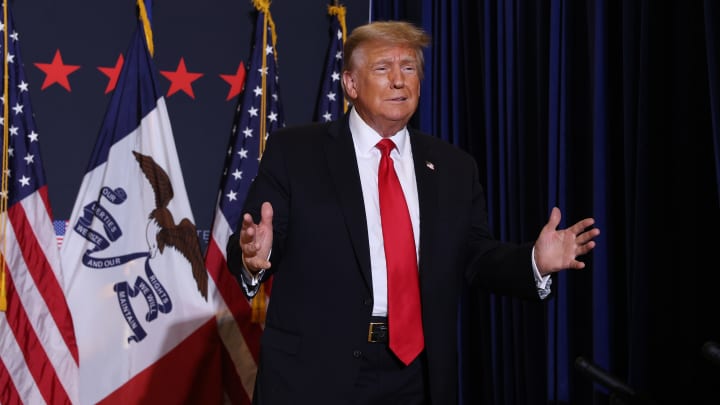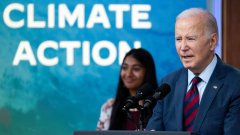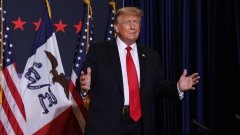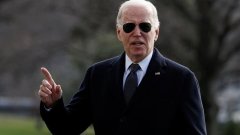
WEST PALM BEACH, Fla. — Former President Donald Trump expects to wrap up his party's nomination by March 19 — about two weeks after the scheduled start of his federal trial on charges of trying to overturn the 2020 election — a senior campaign official told reporters Monday.
The aide, who spoke on the condition of anonymity to openly discuss campaign strategy, said they calculate that Trump will cross the threshold for a majority of delegates to next summer's Republican National Convention on that date, which is referred to by some strategists as Super Tuesday II because of the large number of states holding primaries at the same time.
But if all goes according to plan for Trump, he will put the writing on the wall for his rivals long before that — perhaps as early as Super Tuesday on March 5 or even after the first four caucus and primary contests in Iowa, New Hampshire, Nevada and South Carolina are concluded in late February.
The effort to not just beat his rivals state by state, but to put away the competition as early as possible, is important because Trump's trial in Washington is set to start March 4, and he's on tap for even more court appearances in the other jurisdictions in which he has been indicted.
"I believe the goal is to take him off the trail at a very critical time," Trump senior adviser Susie Wiles said of the trials before a rally at the University of New Hampshire Saturday. "And it's our job to make that not as critical a time by doing our jobs ahead of time and then immediately after. I think he will and we will."
Trump's plan is complicated in particular by the money pouring into the first-in-the-nation caucuses in Iowa from allies of Florida Gov. Ron DeSantis and former U.N. Ambassador Nikki Haley, as well as by Haley's surge in popularity in New Hampshire. While both DeSantis and Haley trail Trump by wide margins in national polls and each of the early states, voters have yet to cast a ballot anywhere. And the Trump-backing super PAC, MAGA Inc.,
If Trump thinks he's going to cruise to the nomination, said one Haley aide, "why is he spending money attacking Nikki in New Hampshire?"
Read more from NBC News:
Tricia McLaughlin, a spokesperson for candidate Vivek Ramaswamy, said her candidate isn't going away.
"Vivek is in it for the long haul," McLaughlin said. "Get ready for a shock!"
And DeSantis often promises that he's going to win the first caucus state, which would throw Trump's plans up in the air.
" We're going to win Iowa," DeSantis said earlier this month on NBC News' "Meet the Press."
The first challenge for Trump is in Iowa, where the senior campaign adviser said his goal is to win by more than 12 percentage points, which would be a record for a competitive Republican presidential contest in the state. In the , Trump led the GOP field with 51%. DeSantis was in second place with 19%, battling for position with Haley at 16%.
More important for next November's general election, Trump is beta-testing a campaign-organizing strategy focused on finding and turning out supporters who haven't voted in the past. It's a model that could easily be converted into a general election tool in swing areas of competitive states.
For the Iowa caucuses, the Trump campaign has tapped 1,800 precinct captains for the caucuses, each of whom is charged with turning out 10 new caucus-goers for the former president. Trump has personally made calls to some of these caucus-goers, his campaign said. His team also met with state party officials last week to ask questions about the mechanics of counting and reporting votes, after Democrats were unable to declare a winner on caucus night in 2020 due to problems with their reporting system. (The GOP caucuses are a straight popular vote, while Democrats' contests involve a more complicated process.)
The effort to expand the Republican electorate is in part a concession to the difficulty of persuading consistent voters to change their minds about a divisive candidate who has been the party's nominee in each of the past two elections. Trump faces a similar challenge with the electorate in general election swing states.
But his team is confident in his prospects for winning back the Oval Office, based on both internal and public data. showed President Joe Biden's approval rating at the lowest point of his presidency, 40%. After defeating Trump handily among in 2020 — Biden won them by more than 20 percentage points — he was locked in competition with Trump with that cohort in the NBC News survey, 46% for Trump to 42% for Biden.
show a similar change. Biden also appears to be , a key demographic for the general election.
For now, though, Trump has to keep much of his focus on the primary and his upcoming court dates, which Wiles described Saturday as a "scheduling nightmare."




